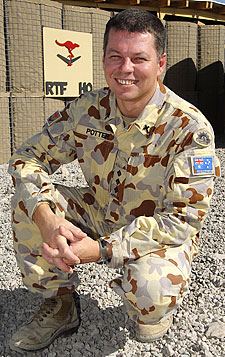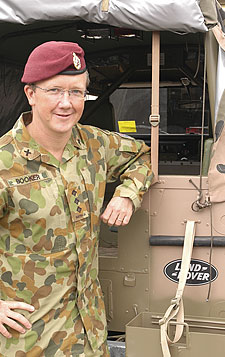Former Sydney Anglican minister the Rev Craig Potter is currently on an overseas posting with the Second Reconstruction Task Force (RTF2) in Afghanistan, where he has been for almost two months of a six month posting.
 Craig is chaplain to 400 soldiers, with a variety of skills including, engineers, infantry, cavalry, signals and more. He says that irrespective of political persuasion, the Australian public should be very proud of the reconstruction work being carried out by Australian soldiers in Afghanistan.
Craig is chaplain to 400 soldiers, with a variety of skills including, engineers, infantry, cavalry, signals and more. He says that irrespective of political persuasion, the Australian public should be very proud of the reconstruction work being carried out by Australian soldiers in Afghanistan.
"They are building bridges, schools, clinics and hospitals, setting up new infrastructure and training local Afghani men in building trades. We are also providing the security so the work can be done in safety. We are doing our best to give the Afghan people a chance at peace" Craig says.
Of the 400 soldiers Craig ministers to, they are predominantly aged 18 to 40 and the majority are not church attendees. However, Craig says they still have a strong sense of morality.
"There is no more serious job in whole world then to have your life threatened or to threaten the life of someone else, the ethic of soldiering is a very sobering one"
"While only a small number [about 30] attend chapel services, people don't join the army without a sense of wanting to do the right things. It's an altruistic thing they are doing which gives me great openings for the gospel."
In fact, Craig says a number of aspects make defence force chaplaincy a strategic form of ministry.
"The Anzac dawn service lends itself to so many gospel themes like sacrifice, duty, and serving other people. It also focuses us on a hope for the future and the resurrection," he says.
"I would say army chaplaincy is different to parish ministry and much more akin to mission work. It is about finding themes that exist in the cultural mindset of soldiers and applying the gospel."
Onward Christian soldiers
Craig says the posting of any soldier overseas has a big cost for the families back home. He says his own wife, Michelle and his children feel the effects of being apart.
Yet Michelle is carrying out her own ministry supporting the wives and partners back in Australia.
"It's a big cost for army families to be separated from husbands or wives. Even though we may be safe, they are worrying about us the whole time. It's a war zone and dangerous things are happening," he says.
Craig says his main roles are to encourage soldiers in their faith, to pray, to give advice, to care for the sick, injured and hurting, and, when necessary, bury the dead and minister to those who grieve. He insists that the role of chaplain is essential to Christian and non-Christian soldier alike.
"There are Christians in the defence force, so we need to minister to them and keep them following Jesus. When things are stressful when lives are at risk, and soldiers are missing their families and frightened, I'm here to point them to Jesus," he says.
From the reserve to the frontline
The new senior minister of St Mary's, Guildford, the Rev Tim Booker was in the Army Reserve as a 20-year-old in the early 1990s, but by his mid-20s had chosen a life of full-time-ministry.
 By 2004 he was chaplain to over 700 men involved in light infantry and airborne operations at the 3rd Battalion of the Royal Australian Regiment at Holsworthy.
By 2004 he was chaplain to over 700 men involved in light infantry and airborne operations at the 3rd Battalion of the Royal Australian Regiment at Holsworthy.
Tim parachuted from aeroplanes, spent weeks camping in the dirt and was the target of a heat seeking missile in Iraq during his three years as chaplain to the paratroopers.
Tim says he never met a genuine atheist in the army.
"When you are standing in the back of a plane about to jump out, everyone is a believer," Tim laughs.
"There is a great spiritual awareness especially in the high-readiness units. The more dangerous something you are more aware you are not in control of everything."
Tim says he had numerous opportunities to share Jesus with soldiers in his three years as chaplain.
"When you get back to normal battalion life, you have the opportunity to talk to people about God. All of your senses are heightened particularly the sense of God, so the opportunities to talk about God come thick and fast."
Tim's had the opportunity to speak with almost all of the 700 personnel about Christianity in that time and handed out over 300 copies of John Dickson's Simply Christianity.
"The book has a great gospel explanation and is written in a clear manner that soldiers love. It's changed a lot of blokes' lives."
As a chaplain to many young soldiers, Tim says he was often working as a "life coach'.
"I saw the typical "young men issues' " cash, chicks and alcohol. Once you get a friendship with a guy and he trusts you and he will come to you with the most hilarious and tragic things that are going on his life," he says.
"I have said to guys, "You're in this catastrophic situation because you're ignoring God'. They sheepishly say, "I know'. I say, "'You've got to stop ignoring him'. They say, "I know'. It's amazing that young men will do unbelievably brave things on the battlefield overseas then do dumb things personally."
From the frontline to the home front
After four months as curate in charge of St Mary’s, Guildford and have been here for 4 months Tim says he misses the camaraderie of the Army and the closeness of the friendships that brings.
"I also miss the daily physical training and spending most of my days chatting to non-Christian blokes about the gospel. And I miss the adventure," he says.
"But I don’t miss only seeing my family for half the year. And I don’t miss the brutal tempo of battalion life."
Tim says that most of parish ministry is spent among Christians or in planning and preparation for teaching and training Christians.
"You’re trying to mobilise your people for their works of service that God's prepared for them to do, whereas chaplaincy was mainly focused on evangelism," Tim says.
Tim says Christians can still support army chaplains and soldiers even while on the home front.
"The best way to support them is by praying for them. If you see them personally, thank them for serving this country and for being prepared to lay down their lives for you. That’s happened to a couple of our blokes and they’ll never forget it," Tim says.




















